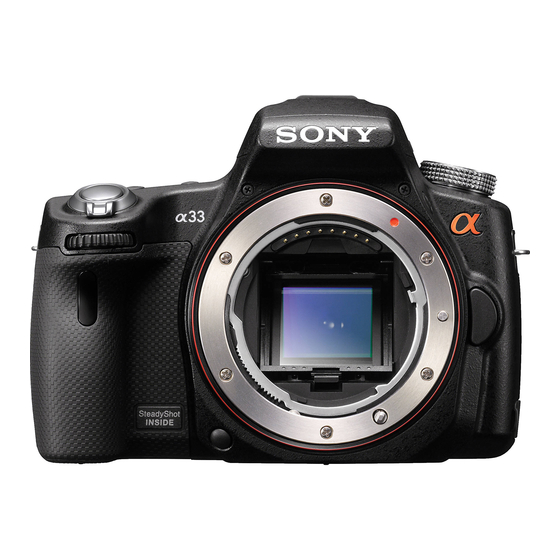- ページ 4
デジタルカメラ Sony SLT-A33のPDF サービスマニュアルをオンラインで閲覧またはダウンロードできます。Sony SLT-A33 30 ページ。 Interchangeable lens digital camera/zoom lens kit
Sony SLT-A33 にも: 機能マニュアル (7 ページ), 仕様 (2 ページ)

CHEMICALS
Some chemicals used for servicing are highly volatile.
Their evaporation caused by improper management affects your health
and environment, and wastes resources.
Manage the chemicals carefully as follows.
•
Store chemicals sealed in a specific place to prevent from exposure
to high temperature or direct sunlight.
•
Avoid dividing chemicals into excessive numbers of small containers
to reduce natural evaporation.
•
Keep containers sealed to avoid natural evaporation when chemicals
are not in use.
•
Avoid using chemicals as much as possible. When using chemicals,
divide only required amount to a small plate from the container and
use up it.
Caution
Danger of explosion if battery is incorrectly replaced.
Replace only with the same or equivalent type.
Dispose of used batteries according to the instructions.
SAFETY-RELATED COMPONENT WARNING!!
COMPONENTS IDENTIFIED BY MARK 0 OR DOTTED LINE WITH
MARK 0 ON THE SCHEMATIC DIAGRAMS AND IN THE PARTS LIST
ARE CRITICAL TO SAFE OPERATION. REPLACE THESE COMPO-
NENTS WITH SONY PARTS WHOSE PART NUMBERS APPEAR AS
SHOWN IN THIS MANUAL OR IN SUPPLEMENTS PUBLISHED BY
SONY.
SAFETY CHECK-OUT
After correcting the original service problem, perform the following
safety checks before releasing the set to the customer.
1. Check the area of your repair for unsoldered or poorly-soldered
connections. Check the entire board surface for solder splashes and
bridges.
2. Check the interboard wiring to ensure that no wires are "pinched"
or contact high-wattage resistors.
3. Look for unauthorized replacement parts, particularly transistors,
that were installed during a previous repair. Point them out to the
customer and recommend their replacement.
4. Look for parts which, through functioning, show obvious signs of
deterioration. Point them out to the customer and recommend their
replacement.
5. Check the B+ voltage to see it is at the values specified.
6. Flexible Circuit Board Repairing
• Keep the temperature of the soldering iron around 270 °C during
repairing.
• Do not touch the soldering iron on the same conductor of the circuit
board (within 3 times).
• Be careful not to apply force on the conductor when soldering or
unsoldering.
SLT-A33/A33L/A33Y/A55/A55V/A55L/A55VL/A55VY_L2
– ENGLISH –
PLASTIC PARTS
Be careful to the following points for plastic parts used in this unit.
•
Use a piece of cleaning paper or cleaning cloth for cleaning plastic
parts. Avoid using chemicals.
Even if you have to use chemicals to clean heavy dirt, don't use paint
thinner, ketone, nor alcohol.
•
Insert the specific screws vertically to the part when installing a
plastic part.
Be careful not to tighten screws too much.
ATTENTION AU COMPOSANT AYANT RAPPORT
À LA SÉCURITÉ!
LES COMPOSANTS IDENTIFIÉS PAR UNE MARQUE 0 SUR LES
DIAGRAMMES SCHÉMATIQUES ET LA LISTE DES PIÈCES SONT
CRITIQUES POUR LA SÉCURITÉ DE FONCTIONNEMENT. NE REM-
PLACER CES COMPOSANTS QUE PAR DES PIÈCES SONY DONT
LES NUMÉROS SONT DONNÉS DANS CE MANUEL OU DANS LES
SUPPLÉMENTS PUBLIÉS PAR SONY.
UNLEADED SOLDER
This unit uses unleaded solder.
Boards requiring use of unleaded solder are printed with the lead free
mark (LF) indicating the solder contains no lead.
(Caution: Some printed circuit boards may not come printed with the
lead free mark due to their particular size.)
: LEAD FREE MARK
Be careful to the following points to solder or unsolder.
•
Set the soldering iron tip temperature to 350 °C approximately.
If cannot control temperature, solder/unsolder at high temperature
for a short time.
Caution: The printed pattern (copper foil) may peel away if the
heated tip is applied for too long, so be careful!
Unleaded solder is more viscous (sticky, less prone to
flow) than ordinary solder so use caution not to let solder
bridges occur such as on IC pins, etc.
•
Be sure to control soldering iron tips used for unleaded solder and
those for leaded solder so they are managed separately. Mixing un-
leaded solder and leaded solder will cause detachment phenomenon.
各種薬品の取り扱いについて
現在使用されている薬品の中には揮発性の高い薬品もありま
す。
それらを不用意に取り扱い蒸発させてしまうと,環境や健康へ
影響を与えたり,資源の無駄使いになります。
各種薬品は,下記の点に注意して取り扱ってください。
・
保管場所を定め,高温になったり直射日光の当たらない場
所に密閉して保管してください。
・
小分け (ハンドラップ等) する数は必要最小限に留め,容器
による自然蒸発を防いでください。
・
作業に使用しない時は,必ずキャップ等をして自然蒸発を
防いでください。
・
薬品を使用する回数を極力少なくし,使用する場合は使用
する量だけ容器より出して受け皿に残さないようにしてく
ださい。
Caution
電池の交換は, 正しく行わないと破裂する恐れがあります。
電池を交換する場合には必ず同じ型名の電池又は同等品と
交換してください。
使用済み電池は,取扱指示に従って処分してください。
サービス,点検時には次のことにご注意ください。
1. 注意事項をお守りください。
サービスのとき特に注意を要する個所については,キャビ
ネット,シャーシ,部品などにラベルや捺印で注意事項を
表示しています。これらの注意書き及び取扱説明書等の注
意事項を必ずお守りください。
2. 指定部品のご使用を
セットの部品は難燃性や耐電圧など安全上の特性を持った
ものとなっています。
従って交換部品は,使用されていたものと同じ特性の部品
を使用してください。
特に回路図,部品表に
印で指定されている安全上重要な
0
部品は必ず指定のものをご使用ください。
3. 部品の取付けや配線の引きまわしはもとどおりに
安全上,チューブやテープなどの絶縁材料を使用したり,
プリント基板から浮かして取付けた部品があります。
また内部配線は引きまわしやクランパによって発熱部品や
高圧部品に接近しないよう配慮されていますので,これら
は必ずもとどおりにしてください。
4. サービス後は安全点検を
サービスのために取外したネジ,部品,配線がもとどおり
になっているか,またサービスした個所の周辺を劣化させ
てしまったところがないかなどを点検し,安全性が確保さ
れていることを確認してください。
5. チップ部品交換時の注意
・ 取り外した部品は再使用しないでください。
・ タンタルコンデンサのマイナス側は熱に弱いため交換時
は注意してください。
6. フレキシブルプリント基板の取扱いについて
・ こて先温度を270℃前後にして行なってください。
・ 同一パターンに何度もコテ先を当てないでください。
(3回以内)
・ パターンに力が加わらないよう注意してください。
– 4 –
– JAPANESE –
樹脂系部品の取り扱いについて
本機に使用されている樹脂系の部品は,下記の点に注意して取
り扱ってください。
・
清掃には薬品を使用せず,清掃紙や清掃布を使用してくだ
さい。
やむを得ず汚れがひどくて薬品を使用する場合は,シン
ナー,ケトン,エーテルは使用しないでください。
・
各部品の取り付けには指定されたねじを使用し,部品に対
して垂直に取り付けてください。
また,ねじを締め付ける時は,無理な力を加えないでくだ
さい。
無鉛半田について
本機には無鉛半田が使用されています。
無鉛半田を使用している基板には,無鉛 (Lead Free) を意味する
レッドフリーマークがプリントされています。
(注意: 基板サイズによっては,無鉛半田を使用していてもレッ
ドフリーマークがプリントされていないものがありま
す)
:レッドフリーマーク
無鉛半田は,下記の点に注意して使用してください。
・
半田こてのこて先温度は約350℃に設定してください。
温度調節が無理な場合は,高温短時間で作業を行ってくだ
さい。
注意: 半 田こてを長く当てすぎると,基板のパターン (銅
箔) がはがれてしまうことがありますので,注意して
ください。また,従来の半田よりも粘性が強いため,
IC端子などが半田ブリッジしないように注意してく
ださい。
・
半田こてのこて先は,必ず無鉛半田用と有鉛半田用に分け
て管理してください。
無鉛半田と有鉛半田が混在すると剥離現象が発生してしま
います。
